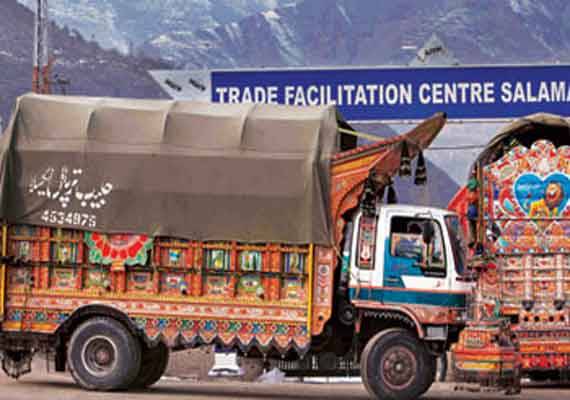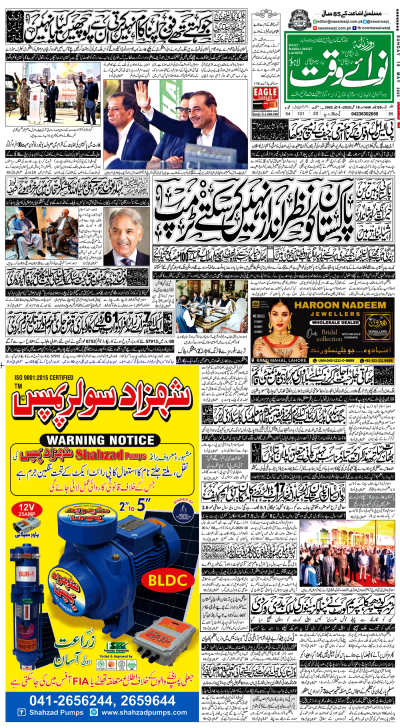Islamabad: On October 2008, India and Pakistan announced commencement of intra-Kashmir trade between divided parts of Jammu and Kashmir as a confidence building measure.
Seven years down the line, the trade has been reduced to mere ‘symbolic gesture’ thanks to politics of acrimony between the two countries.
The cross-LoC trade, which began in 2008 through Salamabad in Uri and Chakan-da-Bagh in Poonch district with two trade facilitation centres, was an important CBM, with Kashmir’s business community hoping to use these routes for transit trade and alternative to Srinagar-Jammu highway which is the only road link connecting Kashmir to the rest of the world.
However, as per the business community things did not go as planned as the politics between India and Pakistan didn’t allow this trade to flourish.
As per the information gathered local media in Held Kashmir, in the beginning of the trade there were around 600 traders who registered with Industries department in order to do business with their counterparts on other side of Kashmir. But now the number of active traders has come down to just 65.
Former president of Kashmir Chamber of Commerce and Industry, Dr Mubeen Shah has stated that intra-Kashmir trade has achieved anything.
“For us this trade was alternative route to outside world including neighboring countries which could have saved us from road blockades on Srinagar-Jammu Highway. We supported this CBM as it provides us alternative route to the world, but unfortunately it has not taken us anywhere,” Shah said.
He added that cross LoC trade cannot be even called CBM in real sense. “It cannot even in real sense be called a trade. The number of tradable items which at the start of the trade were 21 are now even reduced to few.”
“There is no banking facility. The chamber had suggested dual currency (of India as well as Pakistan). But both countries declined. They rather suggested Dollar which would have made LoC an international boundary so we refused it at that time,” he said citing example of Nepal where trade in dual currency is in vogue between India and Nepal.
He said there are no communication facilities. “Neither the individual nor traders’ group is being allowed to visit Azad Kashmir.”
President, KCCI, Mushtaq Ahmad Wani echoed similar views. He added that intra-Kashmir trade has importance for people of the state. “There should be sincere efforts by both the countries to increase the tradable items, install banking facilities and allow communication between traders of both sides,” he said.
Secretary, Salamabad-Chakoti Traders union, Hilal Turki said that traders are losing interest in the cross-LoC trade due to number of hurdles.
“At the start of the trade there were 650 traders who had registered themselves for the trade but now only 60 to 65 traders are actively participating due to lack of banking and communication facilities,” he added.
Turki said that in last 7 years the trade has been halted many times due to one or the other reason. Incidents of drivers carrying banned substance led to halting of trade for weeks together which is a sad part of this trade. “Instead of punishing the accused, both countries go on halting trade for days together,” he said.
“The deficient facilities at the crossing points delay the process and affect the quality of products in transit. Agricultural products account for a bulk of the permissible trading items. Processing, loading and unloading are done manually. Even security check is manual in the absence of X-ray machines.”
Encouraged by the potential of this trade, the Joint Chamber, in a representation to the Foreign Office ahead of the Working Group meeting, had suggested that traders should be allowed to move across the LoC on a ‘trade pass' to facilitate smooth trade and recovery of sales proceeds from both sides.
The Joint Chamber had proposed a multiple-entry pass valid for two years issued on its recommendation and that of other recognized chambers on both sides.
Other demands included banking facilities and expanding the trade list to cover all items manufactured or produced in the two parts of Kashmir, doubling the number of trading days, allowing trucks carrying cross-LoC trade goods to their final destinations, and opening additional routes of Chumb-Pallanwala on the Bhimer-Jammu side and Khoiratta-Noshehra on the Kotli-Rajauri side as these are the shortest and most viable routes for cross-LoC trade.
Some of these demands, like expanding the trade list, have India's support. But the support does not extend to all items. It also stipulates stringent checks to ensure that no product outside the two Kashmirs gets in and benefits from the duty-free trade.
Earlier this year, India sent a proposal identifying J&K Bank to provide banking services. But Pakistan did not inform New Delhi of its reciprocal arrangement till now, the report claimed.






